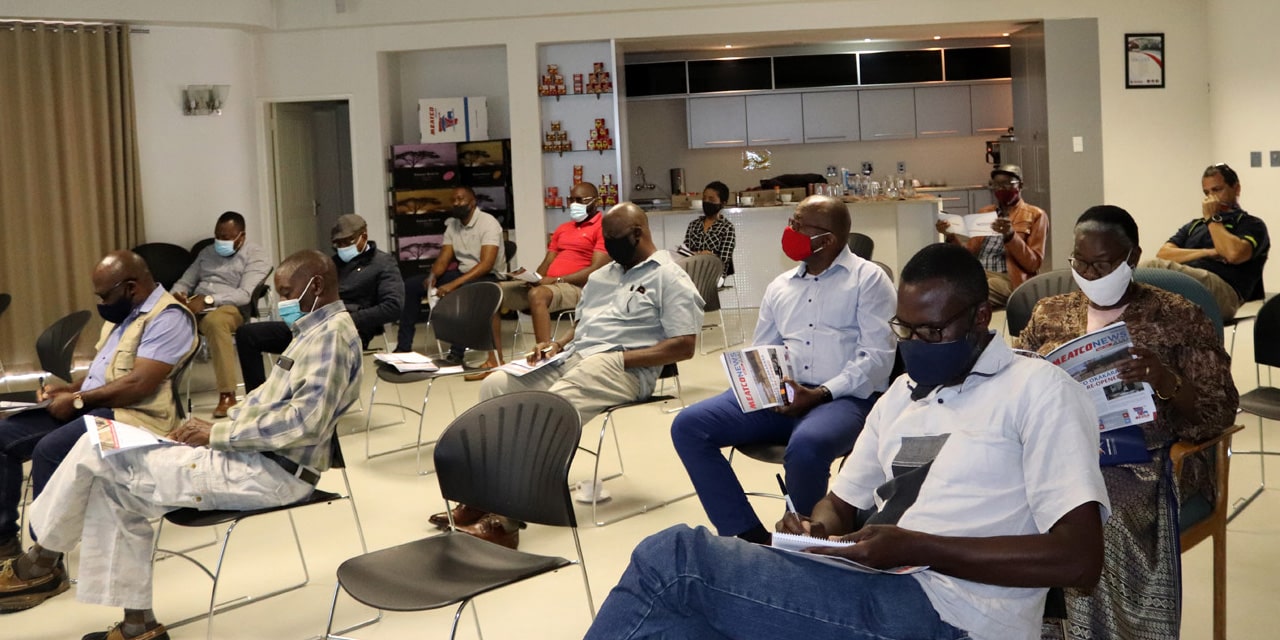Staff Writer
The Meat Corporation of Namibia (Meatco) recently hosted a Stakeholder Engagement Meeting mainly with boardroom farmers or weekend farmers, as they are otherwise known, and members from the Namibia Emerging Commercial Farmers Union (NECFU) with the aiming of engaging on their contribution to the agricultural sector value chain.
Meatco’s Chief Executive Officer, Mwilima Mushokabanji, in his introductory remarks, highlighted how the agricultural sector has evolved from the way it operated 20-30 years ago.
Mushokabanji pointed out that the contribution of agriculture to the gross domestic product of Namibia has gradually declined from 1990 because of declining production. “More than 70% of Namibia’s population are rural dwellers and these are the Namibians who directly or indirectly depend on agriculture for their livelihoods, impressing on how agriculture is the backbone of the Namibian economy. Meatco, as a commercial public enterprise, operates in this agricultural sector and is tasked with the responsibility of establishing functional and lucrative markets,” Mushokabanji said.
He commended government for developing markets, with Namibia remaining the only country in Africa exporting high-quality beef to the United States, China and to Norway..
“As Meatco, at the beginning of this year, we said to ourselves that there is a need for a more energised vision that addresses contemporary issues. We said we want to strive to construct a global brand that will create wealth for Namibia and its people. Hence, the reason for inviting you to this engagement session as we work on inclusivity,” Mushokabanji said.
Meatco’s Executive: Livestock Production and Value-addition, George Kotze, shared Meatco’s plans to help producers improve the quality and quantity of their animals to secure the national herd and throughput to Meatco.
“Platforms such as night school will be developed to address issues of concern, such as leak and pasture management. It is great to see a lot of young farmers this morning here at our meeting,” Kotze said.
Executive: Meatco Foundation, Kuniberth Shamathe, made a detailed presentation on the work of the Foundation, which aims to improve and create marketing platforms for farmers South of the Veterinary Cordon Fence (SVCF) and those North of the Veterinary Cordon Fence (NVCF).
He said the Foundation will assist farmers with improved genetics by making available top-quality bulls, building auction kraals, facilitating rangeland training, and supporting the Meatco Own Cattle (MoC) Scheme. The Foundation will also facilitate urban agriculture projects, such as backyard gardening.
“We also contribute towards the socio-economic empowerment of kapana vendors at auctions that allow them to market their food products and generate income,” Shamathe said.
He said the Meatco Foundation is currently involved in providing inputs regarding the Red Line and how the regulations around the line can be successfully coordinated for the benefit of all Namibian framers. He explained the zoning of areas in the Northern Communal Area (NCA), which will open lucrative markets and allow farmers to access markets through selling their animals both in the NCA abattoirs and SVCF.
The Meatco NCA Subsidiary (Pty) Ltd Chief Executive Officer, Kingsley Kwenani, highlighted the importance of the company as a special purpose vehicle targeted at dealing with animal quality, market-related problems, and training and supporting farmers in the NCA to bring them to the same level with commercial farmers SVCF. “The NCA has 1.6 million animals and with the right policies it can contribute to the growth of the Namibian meat industry both internationally and locally,” he said.
Addressing the same event, Meatco’s Livestock Production Manager: North, Patrick Liebenberg, urged farmers to pull together to sustain the agricultural sector. “As an industry, we should fight to keep slaughter-ready animals within the Namibian borders and avoid them leaving on the hoof for South Africa,” Liebenberg said.
NECFU president, Dr Nac Nghifindaka-Tjiuongua, expressed her gratitude to Meatco for spearheading the initiative. She highlighted how the union has not been receiving adequate support from the industry, although it registered in 2008. “The union is looking forward to continuous engagements of this nature to enhance the members’ knowledge and the entire agricultural sector. I cannot stress enough that the reason we registered as a union is to be organised because recognition can only be achieved through an organised structure, and this is what NECFU represents. We are operating in eight regions, Otjozondjupa north and south, Otjikoto, Omaheke, Hardap, /Kharas, Khomas and Kunene. However, we accommodate individual farmers coming from the NCA,” Nghifindaka-Tjiuongua said.




